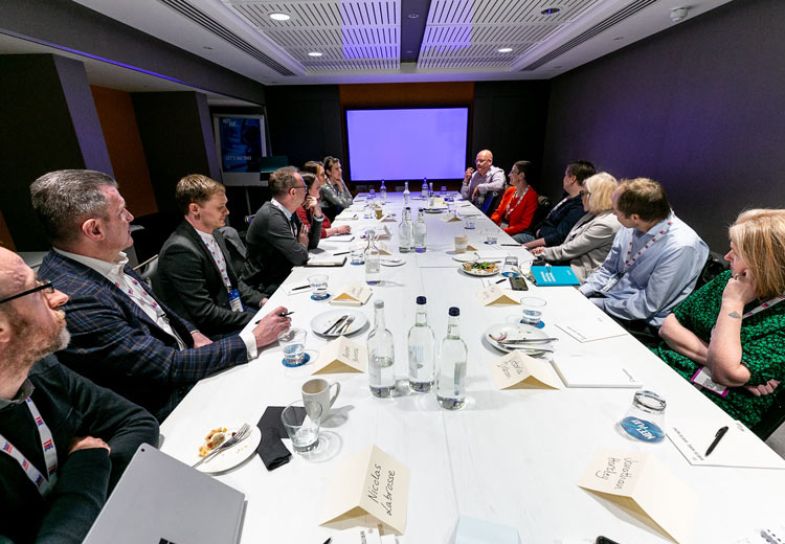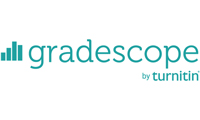
From novel teaching methods to digital assessment, the campus experience is being transformed for academics and students. Support through learning design workshops and sharing insights can help universities transition to a digital future
Tech is disrupting higher education, fundamentally changing how students are taught and assessed, and this digital transformation presents a challenge for all universities.
At a round-table discussion hosted by Gradescope at THE Digital Universities Week 2022, academics shared their insights into the fast-evolving concept of the digital campus, framing digital transformation as an issue of institutional culture, change management and innovation.
Not only did each university face its own challenge when approaching digital assessment, but within each university different disciplines had different experiences with digital tools and how they could best be deployed on campus.
The pandemic forced higher education to make an improvisational pivot to digital teaching and assessment, and in such transitions not all departments had adequate support. Stephanie Marshall, vice-principal (education) at Queen Mary University of London, said it was incumbent on the sector to identify best practice and provide schools with the resources they needed.
“We have perhaps not done enough hand-holding in terms of what is within the art of the [possible],” Marshall said. “That is something that we are going to do now. We are going to do roadshows within the school so that [faculty] can understand what best online assessment looks like from their discipline’s perspective.”
While each discipline has its own assessment methodologies, digital is expanding the options available to academics. Even in STEM subjects, where the panel agreed there was a cultural preference for traditional examinations, there was a willingness to offer alternatives to pen-and-paper assessment.
Digital assessment offered students and academics flexibility. But some sounded a note of caution: it was all too easy to over-assess students, increasing the workload for students and academics alike.
Harriet Dunbar-Morris, dean of learning and teaching at the University of Portsmouth, said that assessment workshops were invaluable. “You look at programme-level assessment, how much assessment is going on, quantity, quality, what it is you are actually doing and how that is experienced by the students,” she said. “Because, alongside exams, in-class tests and summative tests, some of them are having 300 pieces of assessment in one course because staff are thinking about it at a modular or unit level.”
Alex Burford, learning technologist at the University of Edinburgh, argued for a holistic approach through learning design workshops that looked at the student’s learning and assessment experience from the ground up. This had the twofold benefit of addressing academic resistance and over-assessment.
“We would treat assessment as an overall part of that learning design workshop. It has to be integrated into the whole,” she said. “When it is treated like that, colleagues are much more receptive to looking at their course afresh. But you do have to take it completely apart then build it back together because otherwise you get add-ons.”
Higher education needed to listen to students, the panel agreed. With attendance at in-person classes falling, it was imperative to make sessions interactive. Some classes could be credit-bearing, folded into assessment, but institutions had to recognise that students want and expect a degree of flexibility.
Peer-to-peer support was crucial. Bobbi Moore, senior learning designer for digital education at the University of Southampton, said that the mentorship of online learning specialists can drive cultural change. Victoria Dishon, head of IT at the University of Edinburgh, agreed, noting that Edinburgh had much success from embedding a learning technologist within each discipline.
“They become the trusted expert in how you deliver the pedagogy and the technology,” she said. “That has been very powerful for us. We have a learning technologist – at least one – in all of our schools, and they become the bridge between the technology and the pedagogy.”
The panel:
- Alex Burford, learning technologist, University of Edinburgh
- Tom Chapman, deputy head of school (education), University of Southampton
- Victoria Dishon, head of IT, University of Edinburgh
- Harriet Dunbar-Morris, dean of learning and teaching, University of Portsmouth
- Nicolas Labrosse, senior lecturer, University of Glasgow
- Tim Linsey, head of the learning and teaching enhancement centre, Kingston University
- Stephanie Marshall, vice-principal (education‚, Queen Mary University of London
- Bobbi Moore, senior learning designer for digital education, University of Southampton
- Lucy Noble, director of teaching, University of Bath
- Ashton Wenborn, special projects deputy editor, Times Higher Education (chair)
- Ian Whitehead, academic head of online learning, University of Derby
- Jamie Whitehead, product success manager, Turnitin
- Aaron Yaverski, regional vice-president of EMEA, Turnitin
Find out more about how Gradescope can help with a range of subjects and courses.

